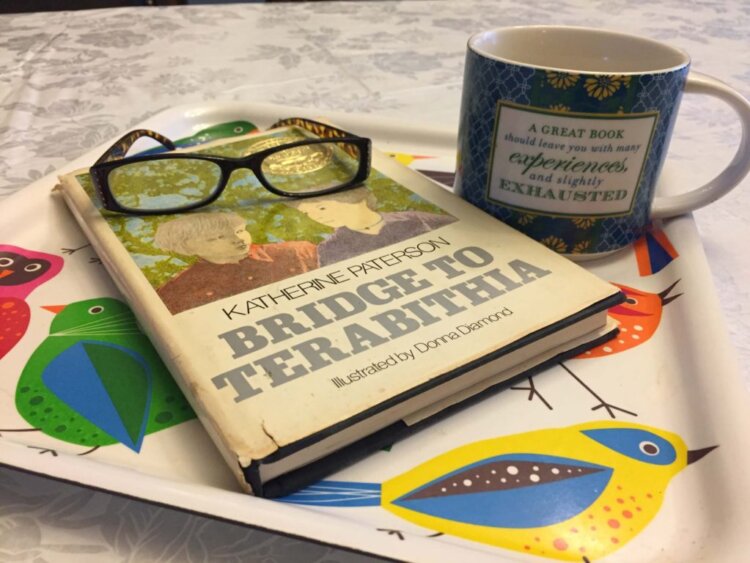
I love books. When I was growing up, I spent most of my free time as I do now – with my nose in one – though the longer, brighter days of summer gave me more freedom to luxuriate between the pages of Little House on the Prairie and later, the Jeffrey Archer titles I borrowed from my parents’ bookshelves. I would bike over to the public library to take out whatever I could carry in my basket, or I would sit there on the vinyl couches, my feet curled up beneath me, and finish a book before I had to go home.
I devoured so many books one year, I won the library’s summer reading contest, designed to encourage pleasure reading. The prize was a hardcover edition of a then-new book called Bridge to Terebithia. It sits here on my bookshelf and I still treasure it. I was over the moon when one of my boys had to read it for a book report.
Though I enjoyed school as a child, was studious even, I relished the freedom of summer. I would grab my things and head home on the last day of school, unencumbered by a reading list or a writing assignment. Summer was pure release, a place in time with its own rules of gravity, and I chose to fill it with books like The Color Purple and The Chosen. No one soured it by telling me what I had to read, or that I had to read at all. Summer was a time to recharge, however we children chose to do so.
Now that I’m a mother, I understand that summer offers a necessary recess from the academic pressures of the school year for the entire family. The youthful possibilities for July and August are endless – camp, a summer job, swimming, fresh corn, ice cream, the catching of fireflies, or the doing of absolutely nothing. And as a parent, I cannot wrap my head around how schools’ requiring my children to read and write essays fits into my — or their — summer plans.
But why is this? I love books! As a child, I read book after book to clear my head, refilling it with lovely stories that took me places that were far, far away. Books like From the Mixed-Up Files of Mrs. Basil E. Frankweiler kept me company on an afternoon when no one was around to play with. They made certain I was never bored in an era when there was not much on daytime television. The details on the pages of Our Bodies, Ourselves and Forever exposed me to the world: a gift for a budding adolescent, who could learn about the birds and the bees and other practical information without having an awkward conversation with her parents.
To me, summer is an opportunity for unassigned kinds of learning. It is the season of growing minds, going places, and exploring subjects that may never make their way onto a middle or high school syllabus. It is for taking the time to answer your own questions, breathe a little, learn about yourself, and find your way.
But summer now bears added responsibility – homework and assigned reading that must be completed before the school year resumes — and it’s my job to make sure my children get it all done. I understand why schools insist the teachers do it. I know that reading for pleasure now competes with Snapchat and YouTube and online gaming. Perhaps assigning summer reading is a way to fortify reading muscles that might atrophy during non-school months. Yet I mourn that my children, forced to complete works of literature and to prove they have read the assigned texts by writing essays about them, will associate summer reading with obligation, not with the pleasure or delight that was my own summer joy.
My sons have very devoted Language Arts teachers who bring the wonder of books into their classrooms. I know that their hands are tied. But I wish they had the freedom to turn back the clock to a time when summer was different and they could encourage summer reading for reading’s sake, not assign it with an endgame in mind.
Still, I sometimes dream that they have staged a rebellion, tearing up their summer reading lists and essay questions. They assign homework only after Labor Day. Only then do they insist that students read the classics, showing them the beauty and universal humanity beneath the language that falls hard, possibly jagged, on their modern ears. They teach students to write papers and essays and book reports. And to my delight, they polish students’ grammar and syntax and prepare them to communicate with the world.
As my fantasy continues to unfold, I see these teachers encouraging students to use July and August as I did, soaking in a story and relishing the turns of phrase with no obligation at all. They suggest students read a book on a topic of their choosing – the story of a rock star or a famous quarterback, a faraway place, a graphic novel about a moment in history that intrigues them, maybe even a novel by Dickens. And they trust their students, refusing to give them busy work to prove they have actually read the assigned texts in question.
If this dream were to become reality, it might even result in something wondrous, likely what the teachers and I have both secretly hoped for all along: a whole generation might embrace reading as an act of love, and they will never forget those who showed them the way.
 Merri Ukraincik is the author of I Live. Send Help., a history of the Joint Distribution Committee, and the Close to Home columnist for the New Jersey Jewish News. Her work has appeared in Tablet Magazine, Hevria, The Wisdom Daily, Kveller, and elsewhere.
Merri Ukraincik is the author of I Live. Send Help., a history of the Joint Distribution Committee, and the Close to Home columnist for the New Jersey Jewish News. Her work has appeared in Tablet Magazine, Hevria, The Wisdom Daily, Kveller, and elsewhere.


Grok Nation Comment Policy
We welcome thoughtful, grokky comments—keep your negativity and spam to yourself. Please read our Comment Policy before commenting.